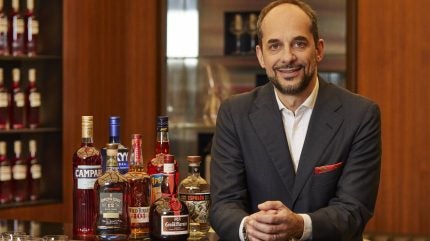
In all the hagiographic coverage from the past six months or so prefacing Bob Kunze-Concewitz’ exit from the Campari Group hot seat, one online article (not on this site, I hasten to add) sticks in my mind. Recounting the CEO’s long list of highs over his 17-year tenure, it suggested that his “flagship achievement” was the acquisition of Aperol.
It would be hard to argue with that assessment, if it weren’t for the inconvenient fact that Campari announced the Aperol deal (part of its €150m Barbero 1891 acquisition) in December 2003, almost two years before Kunze-Concewitz joined the business – and about three-and-a-half years before he became CEO.
But never mind. Kunze-Concewitz may not have masterminded buying Aperol but he did oversee its remarkable transformation from middling aperitif brand to global powerhouse, responsible, at the last count, for 24% of the much-expanded company’s global sales. No wonder that some financial commentator wags have suggested renaming the business Aperol Group.
Beyond correcting the record, we don’t need to dwell long on Kunze-Concewitz’ undoubted successes – not only the development of Aperol, but also the savvy acquisitions of Wild Turkey, Appleton Estate, Grand Marnier and, most recently, Courvoisier. I don’t think many shareholders will begrudge the stonking €30m bonus paid to the Austrian as he stepped down this month.
The more pertinent question is: what’s next? CEO transitions can be a tricky business, particularly when you’re following a success, as Debra Crew at Diageo can testify; as if the untimely death of previous chief executive Ivan Menezes weren’t bad enough, last autumn’s implosion in Latin America has rather clouded the early months of her reign.
I suspect that Matteo Fantacchiotti, Kunze-Concewitz’ replacement, will not have such a difficult time of it, in the early days at least.
If you’re looking for continuity, the first few days of Fantacchiotti’s tenure didn’t disappoint, with the announcement on 19 April of the effective doubling of Aperol’s production capacity via the installation of a dedicated bottling line at Campari’s Novi Ligure plant in Italy.
After Kunze-Concewitz expanded across Europe and North America, Asia is clearly the new frontier under Fantacchiotti
That boost will pave the way for the next phase of Aperol’s quest for global domination: Europe – tick; North America – tick; now for Asia. In early interviews, Fantacchiotti has said as much, bullishly predicting Asia will account for 15-20% of global group sales within five to ten years (it’s about 8% now, and roughly half of that is in Australia).
Fantacchiotti has some expertise here, having joined Campari as MD Asia Pacific in January 2020 (not the best timing, by the way…). He also has the seriously underweight Courvoisier brand to play with in Greater China’s lucrative Cognac market, although – with the $1.2bn-1.32bn deal yet to close and lots of work to do with the underperforming brand – that’s more of a medium- to long-term play.
For now, Aperol will have to do much of the heavy lifting in Asia and it’s building in promising fashion, with triple-digit growth last year in both China and India off an admittedly tiny base. Fantacchiotti has some ideas about targeting Hong Kong and nearby cities with climatic conditions conducive to spritz consumption.
After Kunze-Concewitz expanded across Europe and North America, Asia is clearly the new frontier under Fantacchiotti. But the foundations have already been laid, with accumulated investment in the region, and last year’s tie-in with China’s Sichuan Yibin Wuliangye Group to collaborate on “strategic” goals.
Where some similar agreements in the past have rather smacked of western companies parachuting their brands in and exploiting their partners’ routes to market while allowing them to just get on with their local (baijiu) activities, Wuliangye/Campari at least sounds like more of a genuine partnership.
There’s talk of jointly-formulated products, cross-fertilisation – even the release of a new cocktail, the Wugroni, made with a “special blend” of Wuliangye baijiu co-created by the two companies. There’s a heck of a long way to go – and Campari is playing serious catch-up on its rivals in China – but it’s a promising start.
There are plenty of other pluses for Fantacchiotti as he settles into the CEO’s chair – the continued development of the brands acquired under Kunze-Concewitz, the helpful plunge in agave prices that should deliver considerable cost savings this year for the company’s fast-growing Tequilas.
Change, of course, can still be unsettling, especially after such a long period of stability. It helps, though, if you can keep some things the same to soothe any transition-related worries.
Amid all the glad-handing of Kunze-Concewitz in the Campari AGM press release earlier this month, it would have been easy to skip over an apparently inconsequential paragraph headlined “Approval of the CFOO Last Mile Incentive plan”.
Essentially, this is a performance-related scheme rewarding (with free shares) chief financial and operating officer Paolo Marchesini, and covering the period 2024-31. Not exactly a set of golden handcuffs, perhaps, but a very strong incentive to stay with the company.
Marchesini is a Campari veteran, having joined the business as long ago as 1997, and becoming CFO in 2000. He oversaw Campari’s IPO a year later – and has been there for all that has followed, including not only the Kunze-Concewitz deals but also that Aperol acquisition at the end of 2003.
We pay a lot of attention to CEO switches, and understandably so. But multinational companies are not one-person operations or personal fiefdoms, and change is often progressive and incremental, rather than transformative. At Campari Group, there may be a new captain on the bridge, but there are still plenty of old hands hard at work in the company’s engine room.



